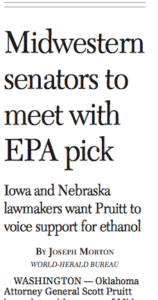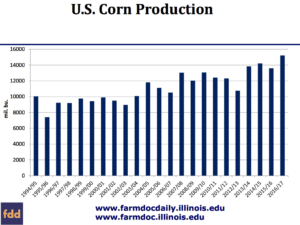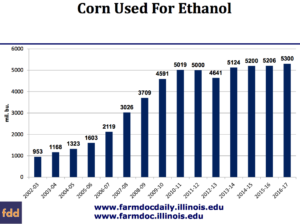Joseph Morton reported on the front page of today’s Omaha World-Herald that, “Oklahoma Attorney General Scott Pruitt has a date with a group of Midwestern senators seeking promises he won’t gut federal policies that promote renewable fuels such as corn-based ethanol.
“Pruitt’s ability to assure those farm-state lawmakers during the meeting, scheduled for this afternoon, could determine whether he’s confirmed as President-elect Donald Trump’s pick to head the Environmental Protection Agency.”

Clip from the front page of today’s Omaha World-Herald.
Mr. Morton explained that, “Pruitt has criticized the agency for what he considers regulatory overreach — a position that thrills regulation-weary farmers and the Republican senators who represent them.
“But Pruitt also has criticized the agency’s Renewable Fuel Standard, echoing complaints from the oil industry that such a policy is simply unworkable. The RFS, which by law requires certain amounts of renewable fuels be blended into the gasoline supply, has been key to the explosive growth of the ethanol industry, particularly in Iowa and Nebraska — the No. 1 and No. 2 ethanol-producing states.”
Today’s OWH article added that, “[Deb Fischer (R., Neb.)] met with Pruitt separately on Wednesday. She said he assured her that he believes in following the law, which calls for the RFS to continue. She said she has heard some concerns from Nebraskans about Pruitt’s nomination.
“‘I’m hopeful that we’ll be able to put their concerns at ease in the nomination process,’ Fischer said.”
Since the drought of 2012, U.S. corn production has been robust, and corn used for ethanol has become an important demand variable in the corn balance sheet.

U.S. corn production has been robust since the drought of 2012.

Although stable for the past few years, corn used for ethanol is still an important component of demand and use.
Beyond corn, the Renewable Fuel Standard also has implications related to advanced biofuels and the biomass-based diesel volume requirement, which could have broader impacts on the soybean complex.

